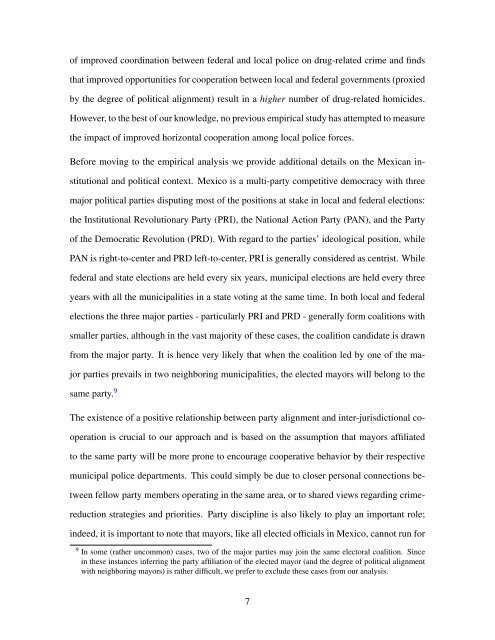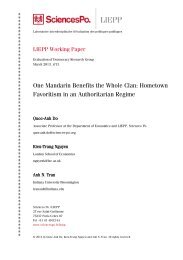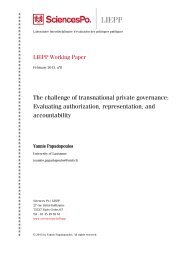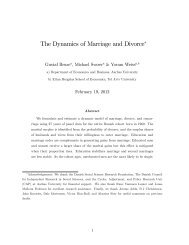Fighting Crime with a Little Help from my Friends ... - Sciences Po
Fighting Crime with a Little Help from my Friends ... - Sciences Po
Fighting Crime with a Little Help from my Friends ... - Sciences Po
You also want an ePaper? Increase the reach of your titles
YUMPU automatically turns print PDFs into web optimized ePapers that Google loves.
of improved coordination between federal and local police on drug-related crime and findsthat improved opportunities for cooperation between local and federal governments (proxiedby the degree of political alignment) result in a higher number of drug-related homicides.However, to the best of our knowledge, no previous empirical study has attempted to measurethe impact of improved horizontal cooperation among local police forces.Before moving to the empirical analysis we provide additional details on the Mexican institutionaland political context. Mexico is a multi-party competitive democracy <strong>with</strong> threemajor political parties disputing most of the positions at stake in local and federal elections:the Institutional Revolutionary Party (PRI), the National Action Party (PAN), and the Partyof the Democratic Revolution (PRD). With regard to the parties’ ideological position, whilePAN is right-to-center and PRD left-to-center, PRI is generally considered as centrist. Whilefederal and state elections are held every six years, municipal elections are held every threeyears <strong>with</strong> all the municipalities in a state voting at the same time. In both local and federalelections the three major parties - particularly PRI and PRD - generally form coalitions <strong>with</strong>smaller parties, although in the vast majority of these cases, the coalition candidate is drawn<strong>from</strong> the major party. It is hence very likely that when the coalition led by one of the majorparties prevails in two neighboring municipalities, the elected mayors will belong to thesame party. 9The existence of a positive relationship between party alignment and inter-jurisdictional cooperationis crucial to our approach and is based on the assumption that mayors affiliatedto the same party will be more prone to encourage cooperative behavior by their respectivemunicipal police departments. This could simply be due to closer personal connections betweenfellow party members operating in the same area, or to shared views regarding crimereductionstrategies and priorities. Party discipline is also likely to play an important role;indeed, it is important to note that mayors, like all elected officials in Mexico, cannot run for9 In some (rather uncommon) cases, two of the major parties may join the same electoral coalition. Sincein these instances inferring the party affiliation of the elected mayor (and the degree of political alignment<strong>with</strong> neighboring mayors) is rather difficult, we prefer to exclude these cases <strong>from</strong> our analysis.7
















